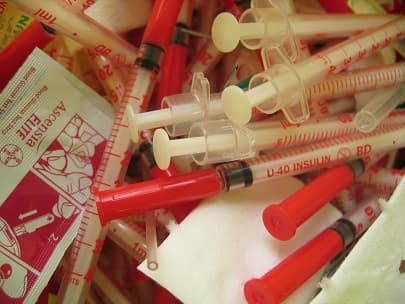USED NEEDLE DISPOSAL

Used Needle Disposal is regulated and requires a licensed medical waste company.
Needle disposal, used needle disposal, syringe disposal, medical waste disposal and sharps container disposal are regulated under the Federal Medical Waste Tracking Act of 1988 (MTWA). The handling of all medical waste shall utilize Universal Precautions, treating all used needles, sharps, medical waste, blood and other Potentially Infectious Materials (OPIM) as Potentially infectious.
Medical waste includes blood and other body fluids including semen, vaginal secretions, cerebrospinal fluid, synovial fluid, pleural fluid, pericardial fluid, peritoneal fluid, amneiotic fluid, saliva in dental procedures, and any body fluid that is visibly contaminated with blood and body fluids in situations where it is difficult or impossible to differentiate between body fluids. Also included are contaminated bandages, dressings, gauze pade, compressed lancets, any item contaminated when rendering emergency medical services, gloves, bedding, used needles and syringes, and medical sharps. This is considered "Regulated Waste" under the Code of Federal Regulations (CFR1910.1030).
Used needles must be packaged in a puncture proof, leak proof, approved sharps container. Disposal of all used neeedles, used syringes, medical sharps and medical waste shall be in accordance with all applicable local, State, and Federal regulations.
SYRINGE AND USED NEEDLE EXCHANGE PROGRAMS (SEP)
In many areas Used Needle Exchange Programs are being established to insure that used needles are disposed of properly and to decrease the risk of transmission of disease. Used needles are exchanged for new needles keeping used needles out of the publics hands. Contact North American Syringe Exchange network (235-272-4857) for more information on this program.
DROP BOX COLLECTION
Some pharmacies, hospitals, doctors offices, Health Departments, Fire Stations and clinics may offer FREE or reduced fee used needle disposal.
In most large cities each year, more than 1 mission used needles are either illegally disposed of or diverted into the illegal drug trade for use by addicts.
DISPOSAL OF MEDICAL SHARPS

Improperly managing, storing or securing used needles and medical sharps for disposal allows used needles, syringes and other medical sharps to pose a health risk to the public and other workers. Loose used needles thrown illegally into household and other trash containers and bags expose waste management workers to the potential of needle sticks and occupational exposure to bloodborne pathogen incidents. This illegal disposal of used needles and syringes may result in the transmission of HIV, Aids, Hepatitis, and other serious bloodborne illnesses. Records must be kept on employee occupational exposure incidents for 30 years past the last date of employment (CFR 1910.1030).
PETS: Each year many household pets are injured or killed when they swallow used needles and syringes, resulting in a horrific and painful death. Never dispose of loose used needles in the trash.
USED NEEDLE DISPOSAL OPTIONS
Sharps mail-back services are a good safe way to dispose of low volumes of used needles and syringes. Sharps mail-back services are an economical time saver. New sharps containers are mailed to the home and, when full of used needles and syringes, mailed back for processing and disposal.
MEDICAL WASTE DISPOSAL COMPANIES
Large volume generators of used needles, syringes and medical waste may choose a medical waste disposal company as the disposal choice. There are many medical waste companies that service hospitals, doctor's offices, dental offices, and other patient care facilities. Depending on the type of medical waste and sharps disposal required, generators of smaller amounts of medical waste and used needles may also want to contract with a local, licensed medical waste disposal company. Local, licensed medical waste carriers may better meet the scheduling and pricing requirements of low volume generators such as dental offices, medical offices and clinics. All medical waste companies disposing of used meedles and medical sharps are required to be licensed and insured, and are subject to the same State, local and Federal Regulations and reporting requirements regardless of the size of the medical waste company.
MEDICAL WASTE TRACKING ACT
The Medical Waste Tracking Act of 1988, Defined Medical Wastes and established which medical wastes would be subject to program regulations.
The Medical Waste Tracking Act of 1988 established a cradle to grave tracking system utilizing a medical waste generator tracking form reffed to in the industry as a manifest.
The Medical Waste Tracking Act of 1988 required management standards for segregation, packaging, labeling and marking and storage of the medical waste.
The Medical Waste Tracking Act of 1988 established record keeping requirements and penalties that could be imposed for mismanagement.
Do not dispose of used needles in the trash -- it is illegal. This may transmit disease to public workers and the general public!
Pets and wildlife may eat used needles and die a horrific death.
Impropertly disposed of medical waste may be illegally dumped requiring the service of a specialized BioHazard Remediation Company to pickup and repackage the used needles and medical waste.